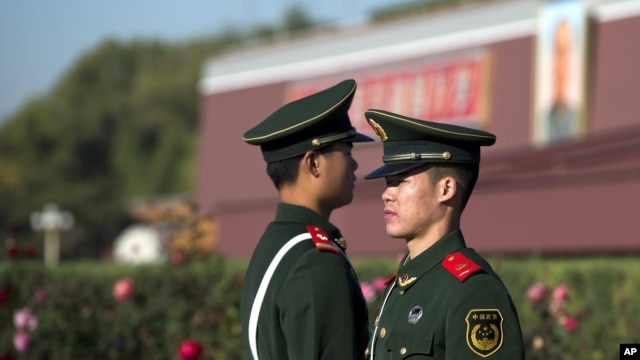
Chinese paramilitary policemen stand guard near Tiananmen Gate in Beijing, November 1, 2012.
Senior Chinese Communist leaders have gathered amid heavy security for a closed-door meeting in Beijing, where they will put the finishing touches on a once-a-decade leadership handover that officially begins next week.
China's state-run Xinhua news agency said the final gathering of the Communist Party's 17th Central Committee opened Thursday. The short memo said that changes to the party's constitution and other proposals are being discussed.
Expected to last for about a week, the meeting will likely result in the formal expulsion of disgraced politician and former Politburo member Bo Xilai, who is expected to stand trial soon for corruption and other charges.
It also represents one of the last chances for Communist leaders to haggle over party leadership positions to be unveiled at the 18th Party Congress beginning next Thursday.
​​Bo's case, along with several other high-profile corruption scandals, have placed Communist leaders on edge ahead of the already sensitive transition, with security being ramped up across the capital. Xinhua says 1.4 million people have volunteered to help police "maintain stability" during the meeting.
Many public events have been canceled or postponed in Beijing, and some areas have been declared off-limits. Some stores throughout the city have been told not to sell knives, scissors or other potentially dangerous items, while police are carrying out random security checks with increasing frequency.
Rachel Lu, editor of Tea Leaf Nation, a website that monitors Chinese social media, tells VOA that some taxi cab drivers have even been instructed to modify their vehicles to ensure that passengers do not use windows to distribute leaflets with what the state calls "adverse information."
"If you're taking a taxi, you'll probably notice that in the back seat where you can roll down the window, the knob has been taken off by order of the police. And the argument from the police apparently is that you can't roll down the window and distribute leaflets," says Lu. "And we're seeing discussed on social media that even if you're sitting in the front seat, the taxi driver is supposed to stop you from rolling down the window to prevent you from distributing a leaflet."
Lu says the massive security lockdown, which Tea Leaf Nation described as "war-like" has prompted complaints on China's Twitter-like site Weibo, with many wondering if officials are overreacting. But she says much of the reaction has been humorous.
"People are sort of making fun of these measures, and basically asking what are [the authorities] afraid of," Lu explains. "And no one knows the answer to that question: why is it so extreme? But I think people are kind of just taking it as it is, kind of making fun of it."
The Communist Party-controlled Global Times on Thursday acknowledged that "some netizens have cast doubts over such keen preparations." But the paper insisted that any disruptions to daily life are worth the cost of creating a "favorable environment for a smooth Congress." |
|
